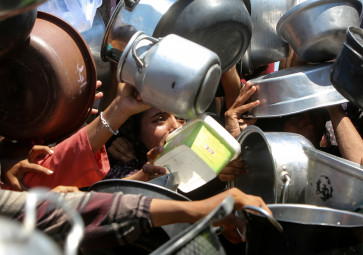Popular Reads
Top Results
Can't find what you're looking for?
View all search resultsPopular Reads
Top Results
Can't find what you're looking for?
View all search resultsMedia sparks Idul Fitri shopping sprees
The habit of compulsive shopping ahead of Idul Fitri is not only about buying necessities, but also as a way to flaunt ones social status, a study indicates
Change text size
Gift Premium Articles
to Anyone
T
he habit of compulsive shopping ahead of Idul Fitri is not only about buying necessities, but also as a way to flaunt ones social status, a study indicates.
“Where you shop for Idul Fitri is a way to show your status in society,” said researcher Zully Qodir, a social and political sciences lecturer at Yogyakarta’s Gadjah Mada University (UGM) in a recent dialog at the UGM.
For the sake of being able to shop for Idul Fitri, he added, many people were willing to spend 11 months worth of their savings. Many migrant workers in Jakarta work all year and then spend their savings to celebrate Idul Fitri in their hometowns.
He went on to say that based on a survey conducted with consumers in a boutique, a majority of customers bought clothes not because they need them, but simply to draw attention to their status.
UGM economic science lecturer Ahmad Ma’ruf said compulsive shopping was futher spurred by media provocation.
“Currently, most of the advertising spaces on television and in print media have been booked by large-scale companies offering a variety of products,” said Ma’ruf.
Consequently, household spending of people from the low-income bracket increases up to 45 percent.
Further, Ma’ruf estimated that the circulation of money during Idul Fitri shopping in Indonesia amounted to Rp 84 trillion (US$8.82 billion). “Bank Indonesia even predicted Rp 89 trillion,” he said.
A huge amount of the profits from the compulsive Idul Fitri shopping sprees are enjoyed by large-scale capitalists. “Small-scale businesses and street vendors also reap profits, but the percentage is very small,” said Ma’ruf.
Compulsive Idul Fitri shopping by Indonesians has been ocurring since the 1990s along with the rise in per capita income. Shopping is also done by other more established communities. “Members of the European community, for example, shop, but they don’t force themselves to do so,” said Ma’ruf.
He acknowledged that it was not possible to stop compulsive Idul Fitri shopping, but it could be curbed by educating consumers on shopping awareness.










